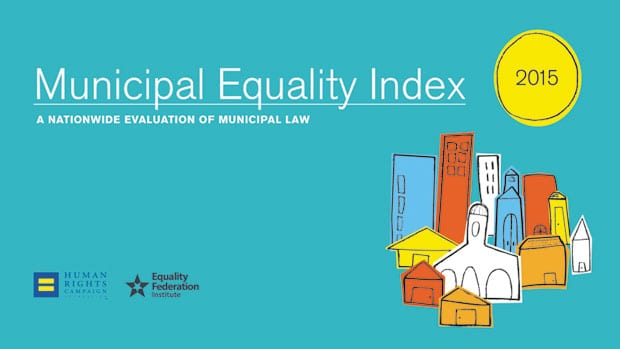Dallas, Austin score 100; FW gets 99

Tammye Nash | Managing Editor
The Human Rights Campaign Foundation has officially released its 2015 Municipal Equality Index, and as expected, the Metroplex’s two largest cities scored well on the national organization’s annual survey.
Despite concerns that Dallas might lose points after city officials released initial MEI results to the press back in October, before the scores were finalized, Dallas was one of 47 cities or municipalities nationwide to receive a perfect score.
Across the Trinity, Fort Worth received a near-perfect 99. But David Mack Henderson, president of Fairness Fort Worth, questioned the survey’s accuracy and its usefulness.
“We’re losing sight of real advances for our people when the insatiable sell rests upon a quick score. ‘Give me a number.
100! Woohoo! We’re perfect!’ Or, ‘99, ah shucks, just a tiny blemish,’” Henderson said. “Yet hovering beneath those perfect and near perfect scores, one finds that a city is missing such crucial coverage as trans benefits, a human relations commission or anti-bullying protection for children.”
A statement released by HRCF announcing the new MEI numbers notes that the number of cities receiving perfect scores has “more than quadrupled” since the first MEI was released in 2012. “Today, at least 32 million people live in cities with fully-inclusive local protections that are not guaranteed by the states in which they live,” according to the statement.
The statement also notes, however, that criteria for earning points has changed, and that since the Supreme Court decision in June legalizing same-sex marriage, the criteria no longer include relationship recognition, instead “placing greater emphasis on non-discrimination protections.”
“Key findings” highlighted in the survey include the fact that “every region in the country boasted at least one 100-point city, showing commitment to LGBT equality in all regions of the country. In addition, 66 cities — or 16 percent of those surveyed — offer transgender-inclusive health care options to employees.
The average city score was 56 points, and 25 percent of the cities surveyed scored more than 78 points. Only 5 percent scored less than 10 points.
The survey included all 50 state capitals, the country’s 200 largest cities and the five largest cities in each state, plus the cities home to the two largest public universities in each state and 75 cities that have high proportions of same-sex couples.
The MEI surveyed 23 cities in Texas. Of those, two — Dallas and Austin — received 100 points, and Fort Worth claimed 99 points. Four of the Texas cities surveyed received 0 points.
The cities in the survey are evaluated in five major categories: Non-discrimination laws, the municipality as an employer, municipal services, law enforcement, and relationship with the LGBT community. Cities were also able to earn “bonus points” in most categories.
Dallas scored 84 points out of 100 in the main categories, but earned 18 bonus points to put the city over the 100-point mark (no scores over 100 were awarded). Big D lost six points under the “municipality as an employer” category for not offering transgender-inclusive insurance options.
Dallas scored only six of 16 points under municipal services, losing five points each for not having a human rights commission and not having an LGBT liaison in the mayor’s office. But the city won bonus points for being a welcoming place to work, having an enforcement mechanism in the rights ordinance, providing services to the LGBT youth and elderly populations, providing services to people with HIV/AIDS, having openly elected or appointed city officials and being pro-equality despite restrictive state laws.
Fort Worth scored 86 points and 13 bonus points. Cowtown also lost 6 points for not having trans-inclusive insurance options, and for not having an enumerated anti-bullying policy in its schools (a point of contention for Henderson who said that the city has no control over school policies and that Fort Worth ISD does, indeed, have enumerated anti-bullying policies and was one of the first school districts in Texas to do so).
Under “relationship with the LGBT community,” Fort Worth received only four of five possible points for “leadership’s public position on LGBT equality,” and only two of three possible points for “leadership’s pro-equality legislative or policy efforts.” The city received bonus points for being a welcoming place to work, for having a human rights commission, providing services to LGBT homeless people and those with HIV/AIDS, and for being pro-equality despite restrictive state laws.
Austin scored 95 points and 16 bonus points, losing points only for not having an LGBT liaison in the mayor’s office.
Texas cities receiving scores of 0 were College Station, Irving, Lubbock and Mesquite.
For complete results, visit HRC.org/Campaigns/Municipal-Equality-Index.
This article appeared in the Dallas Voice print edition December 25, 2015.


